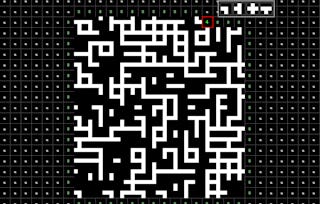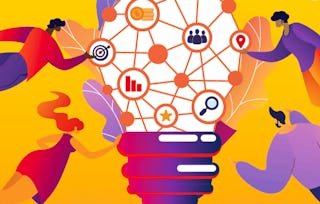This course is for anyone who would like to apply their technical skills to creative work ranging from video games to art installations to interactive music, and also for artists who would like to use programming in their artistic practice.


Creative Programming for Digital Media & Mobile Apps


Creative Programming for Digital Media & Mobile Apps



Instructors: Prof Marco Gillies
17,658 already enrolled
Included with
55 reviews
Skills you'll gain
Details to know

Add to your LinkedIn profile
See how employees at top companies are mastering in-demand skills

There are 5 modules in this course
This week we are getting up and running with the Processing IDE. We will show you the basics of writing Processing sketches then move onto some graphics and audio concepts. Mick will then introduce our first audiovisual example - SonicPainter, which allows users to interactively paint with synchronised graphics and sound.
What's included
11 videos4 readings6 assignments1 peer review
This week we are looking at using images and video, and also finding out how to control sound more fully in an interactive way. We're going to be showing you a really basic interactive VJ/DJ app called 'DJTube', which is a very simple example of how to create and load video, images and animations on desktops / mobile devices, and also use them as a basic user interface.
What's included
8 videos2 readings5 assignments
This week is all about creating an Audiovisualiser. This is a really popular and interesting topic that has lots of applications, from music players, to game engines, to more complex things such as DSP. We'll be learning about algorithmic graphics, audio analysis, and also about using the accelerometer features of your phone. Remember that many desktops don't have accelerometers, no matter how much you shake them!
What's included
8 videos2 readings6 assignments1 peer review
This week we will be creating a physics based game using a Physics engine based on Box2D. Physics engines are a fantastic way of creating dynamic gameplay that models the real world. Box2D is one of the most popular because it is optimised to be fast for 2D games that don't need the heavy processing of a 3D engine. It is used in many important 2D games, most famously Angry Birds. We will be using boxwrap2D which is a Java port of the original C++ version of Box2D, that is designed to work with Processing. Since boxwrap2D is java only we have created our own port to JavaScript, which interfaces to the javascript version of Box2D, but provides an almost identical interface to the Processing version.
What's included
9 videos2 readings6 assignments
Welcome to the final week of Creative Programming for Digital Media and Mobile apps. This week, we are going to move back to one of our favorite areas of app development - music apps. We have a very special guest this week - Martin Roth from RJDJ. Martin has lots of experience working on consumer mobile music applications, including the amazing Inception app, and The Dark Knight Rises. He shares his views on the expanding space in mobile music applications, and offers us his opinion on the WebAudio API. Meanwhile, Matt will be showing you how to create a very basic drum sequencer, and Marco will take you through the basics of sliders and multisliders, which are particularly useful for controlling parameters in music apps. Mick will then be taking you through some synthesiser examples in WebAudio, and talk you through the Music Machine example, which is a great place to kick off making a professional interactive music app for mobile.
What's included
6 videos1 reading4 assignments1 peer review
Instructors


Explore more from Software Development
 Status: Free Trial
Status: Free TrialUniversity of Michigan
 Status: Free Trial
Status: Free TrialArizona State University
 Status: Free Trial
Status: Free TrialUniversity of Michigan
 Status: Free Trial
Status: Free TrialUniversity of Michigan
Why people choose Coursera for their career

Felipe M.

Jennifer J.

Larry W.

Chaitanya A.
Learner reviews
- 5 stars
60%
- 4 stars
16.36%
- 3 stars
5.45%
- 2 stars
7.27%
- 1 star
10.90%
Showing 3 of 55
Reviewed on Feb 22, 2022
This was a great class that shows that programming can still be fun.
Reviewed on Nov 5, 2016
Awesome course. It's packed with tons of information on how to get started making cool interactive programs, especially if you are a music junkie like myself. Great work!
Reviewed on Jun 10, 2017
Having so much fun programming with processing, the programming concepts and animation is simple to understand with this programming environment

Open new doors with Coursera Plus
Unlimited access to 10,000+ world-class courses, hands-on projects, and job-ready certificate programs - all included in your subscription
Advance your career with an online degree
Earn a degree from world-class universities - 100% online
Join over 3,400 global companies that choose Coursera for Business
Upskill your employees to excel in the digital economy
Frequently asked questions
To access the course materials, assignments and to earn a Certificate, you will need to purchase the Certificate experience when you enroll in a course. You can try a Free Trial instead, or apply for Financial Aid. The course may offer 'Full Course, No Certificate' instead. This option lets you see all course materials, submit required assessments, and get a final grade. This also means that you will not be able to purchase a Certificate experience.
When you purchase a Certificate you get access to all course materials, including graded assignments. Upon completing the course, your electronic Certificate will be added to your Accomplishments page - from there, you can print your Certificate or add it to your LinkedIn profile.
Yes. In select learning programs, you can apply for financial aid or a scholarship if you can’t afford the enrollment fee. If fin aid or scholarship is available for your learning program selection, you’ll find a link to apply on the description page.
More questions
Financial aid available,
¹ Some assignments in this course are AI-graded. For these assignments, your data will be used in accordance with Coursera's Privacy Notice.



